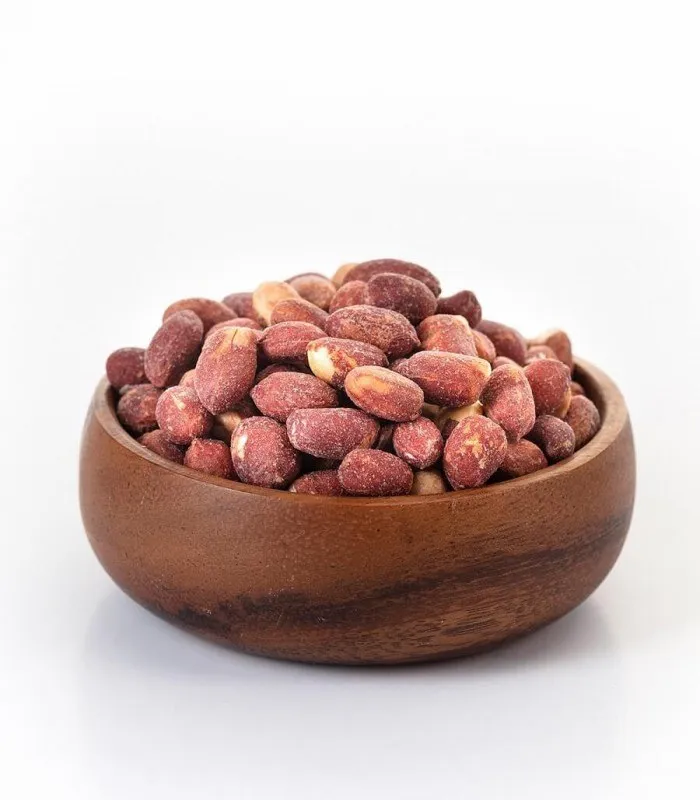Roasted peanuts, a beloved snack enjoyed by many, can be made at home with relative ease. This article will provide a step-by-step guide on how to roast peanuts at home, along with the necessary ingredients and equipment needed for the process. Additionally, it will discuss the benefits of homemade roasted peanuts compared to store-bought alternatives, and offer some creative variations for flavored peanuts.
To start, the main ingredient needed is raw peanuts. These can typically be found in grocery stores or specialty food shops. It’s important to select high-quality peanuts, as they will greatly impact the final taste and texture of the roasted nuts. Additionally, the peanuts should still be in their shells, as this helps to retain their natural oils and enhances the roasting process.
The first step in roasting peanuts at home is to preheat the oven to 350°F (175°C). While the oven is heating up, the peanuts need to be prepared. Begin by rinsing the peanuts in water to remove any dirt or debris. Next, spread the peanuts out in a single layer on a baking sheet. It’s crucial to ensure that the peanuts are evenly spread out, as this promotes even roasting.
Once the oven has reached the desired temperature, place the baking sheet with the peanuts on the middle rack. Roasting times can vary depending on personal preference, but a general guideline is to roast for about 15-20 minutes. However, it’s necessary to check on the peanuts regularly to prevent them from burning. A good indicator of doneness is when the peanuts turn a slightly darker shade of brown and release a pleasant aroma.
Upon removing the peanuts from the oven, it’s important to let them cool before consuming. The cooling process allows the peanuts to become more crisp and enhances their flavor. Once cooled, the peanuts can be enjoyed as is, or they can be shelled for easy snacking. Additionally, roasted peanuts can be stored in an airtight container for up to one month.
There are several benefits to making roasted peanuts at home instead of purchasing them from stores. Firstly, homemade roasted peanuts offer the advantage of being customizable. Individuals can adjust the level of salt and seasonings added to suit their preference. Additionally, homemade roasted peanuts eliminate the need for preservatives and artificial additives that are commonly found in commercially packaged peanuts.
Furthermore, making roasted peanuts at home allows individuals to control the quality of the ingredients used. By selecting fresh, high-quality peanuts, individuals can ensure that they are consuming a healthier snack devoid of any potential toxins or pesticides. Additionally, homemade roasted peanuts offer a higher nutritional value compared to store-bought alternatives. Peanuts are an excellent source of protein, healthy fats, and essential vitamins and minerals, making them a nutritious addition to any diet.
For those looking to add some variety to their roasted peanuts, there are numerous creative flavoring options to explore. One popular variation is honey-roasted peanuts. To make these, simply toss the peanuts in a mixture of honey, melted butter, and a pinch of salt before roasting. The result is a delightful combination of sweet and savory flavors. Another option is to add spices such as cinnamon, cayenne pepper, or smoked paprika to the peanuts before roasting, giving them a unique and flavorful twist. The possibilities for flavor experimentation are endless, allowing individuals to tailor their roasted peanuts to their taste preferences.
In conclusion, making roasted peanuts at home is a simple and rewarding process. With just a few steps, individuals can enjoy the delicious taste and numerous benefits of homemade roasted peanuts. From the customizable flavorings to the higher nutritional value, homemade roasted peanuts are a healthier and more fulfilling alternative to store-bought options. So why not try making your own batch of roasted peanuts at home and experience the joy of this classic snack?Title: The Business of Homemade Roasted Peanuts
Introduction:

Roasted peanuts have always been a popular snack enjoyed by people of all ages. While many rely on store-bought options, there is a growing market for homemade roasted peanuts. This article will delve into the business aspects of producing and selling homemade roasted peanuts. From sourcing and packaging to marketing and distribution, we will explore the key considerations and strategies to ensure a successful venture in the roasted peanuts industry.
1. Sourcing High-Quality Peanuts:
The first step in creating a homemade roasted peanuts business is sourcing high-quality peanuts. Establishing relationships with reputable suppliers is crucial to ensure the consistency and quality of the product. Consider working directly with farmers or engaging in partnerships with organic peanut farms to appeal to health-conscious consumers. Additionally, exploring fair trade options can attract socially responsible customers.
2. Roasting Equipment and Production:
Investing in the right roasting equipment is vital for a successful homemade roasted peanut business. Depending on the scale of operations, options range from small tabletop roasters to larger batch roasting machines. It is crucial to choose equipment that guarantees even roasting and allows for easy temperature control. Furthermore, establishing effective production processes, including quality control measures, will ensure consistent flavor and texture.
3. Packaging and Branding:
The packaging plays a significant role in attracting customers and conveying the quality of the product. Consider using eye-catching designs that reflect the homemade and natural elements of the roasted peanuts. Opt for environmentally friendly packaging options to align with eco-conscious consumers. Add informative labels that highlight the health benefits, nutritional value, and flavor variations to make the product stand out in the market.
4. Compliance and Food Safety:
Operating a homemade roasted peanuts business requires complying with food safety regulations and obtaining necessary certifications. Develop standard operating procedures (SOPs) that outline hygiene practices, pest control measures, and proper product handling. Regular inspections and audits are necessary to maintain high levels of food safety compliance, ensuring customer trust and loyalty.
5. Marketing and Brand Building:
To build a strong customer base, effective marketing strategies are essential. Develop a unique selling proposition (USP) that sets the homemade roasted peanuts apart from competitors. Leverage social media platforms to showcase the production process, share recipe ideas, and engage with the target audience. Collaborate with local health food stores, farmers markets, and other relevant retailers to expand distribution channels and reach a wider consumer base.

6. Creating Value-Added Products:
Diversifying the product line can be a valuable strategy to attract a wider range of customers and increase sales. Explore opportunities to create value-added products such as flavored roasted peanuts, peanut butter, or peanut brittle. These variations can be marketed as premium options, appealing to customers seeking unique and indulgent snacks.
7. Wholesale and Retail Distribution:
Decide on the distribution strategy based on the target market and available resources. Both wholesale and retail options can be explored. For wholesale distribution, approach local grocery stores, gourmet food shops, and health food retailers to establish partnerships. On the retail side, consider selling directly to consumers online through an e-commerce platform or local delivery services.
8. Pricing Strategy and Profit Margins:
Determining the right pricing strategy is crucial for the success of the business. Consider factors such as production costs, packaging expenses, marketing expenses, and desired profit margins. Conduct market research to assess competitor pricing and align with the perceived value and quality of the homemade roasted peanuts. Offering different package sizes can cater to various customer preferences and increase overall sales.
9. Customer Feedback and Continuous Improvement:
Regularly seeking feedback from customers is essential for business growth. Encourage customers to share their experiences, suggestions, and flavor preferences. Actively listen to their feedback and make necessary adjustments to meet evolving consumer demands. Consider introducing seasonal flavors or limited-edition variations to create excitement and encourage repeat purchases.
10. Scaling up the Business:
As the homemade roasted peanuts business grows, scaling up operations becomes necessary. This may involve investing in larger roasting equipment, expanding production facilities, and hiring additional staff. Explore options for outsourcing certain aspects, such as packaging or distribution, to specialized service providers to optimize efficiency and focus on core business operations.
Conclusion:

Starting a homemade roasted peanuts business can be a lucrative venture if executed with careful planning and attention to detail. From sourcing high-quality peanuts to effective marketing and distribution strategies, there are several key considerations that contribute to success. By focusing on providing a high-quality product, building a strong brand, and engaging with the target market, entrepreneurs can tap into the growing demand for homemade snacks and establish a thriving roasted peanuts business.










